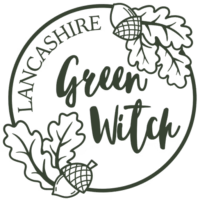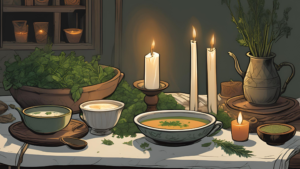Imbolc Food & Recipes: Celebrate with Nourishing Traditions
Imbolc, celebrated on 1st February, is a time to honour Brigid, the Celtic goddess of fertility, healing, and poetry, and to welcome the returning light as the Earth stirs from winter’s slumber. Food plays a vital role in this celebration, connecting us to the themes of renewal, abundance, and gratitude. In this post, we’ll explore the traditional foods of Imbolc, share nourishing recipes, and discuss how to infuse your meals with magical intention.
The Significance of Food at Imbolc
Imbolc marks the halfway point between the winter solstice and the spring equinox, a time when our ancestors would celebrate the first signs of spring. Food prepared during this festival reflects the season’s bounty and the hope for abundant harvests to come. Dairy products, grains, and warming herbal teas are common staples, symbolising nourishment, warmth, and the life-giving power of the Earth.
Traditional Foods for Imbolc
Here are some classic foods associated with Imbolc and their symbolic meanings:
- Dairy Products: Milk, butter, and cheese honour Brigid’s connection to livestock and fertility.
- Oats and Grains: Represent abundance, sustenance, and the cycles of life.
- Herbal Teas: Warming and healing, they connect us to the Earth’s herbs.
- Root Vegetables: Carrots, parsnips, and potatoes symbolise grounding and resilience.
- Honey: A symbol of sweetness and the rewards of hard work.
Recipes to Celebrate Imbolc
Here are some simple and traditional recipes to help you celebrate Imbolc with intention and gratitude:
1. Oatcakes with Honey Butter
Ingredients:
- 200g rolled oats
- 50g plain flour
- 1/2 tsp salt
- 1/2 tsp baking soda
- 50g unsalted butter (melted)
- 60ml hot water
- Honey for serving
Instructions:
- Preheat your oven to 180°C (fan) or 200°C (regular).
- In a bowl, mix the oats, flour, salt, and baking soda.
- Add the melted butter and hot water, stirring to form a dough.
- Roll out the dough to about 5mm thickness and cut into rounds.
- Place on a baking tray and bake for 15 minutes or until golden.
- Serve warm with honey butter.
2. Imbolc Creamy Potato Soup
Ingredients:
- 500g potatoes, peeled and diced
- 1 onion, finely chopped
- 2 cloves garlic, minced
- 750ml vegetable stock
- 250ml double cream
- 1 tbsp butter
- Salt and pepper to taste
Instructions:
- In a large pot, melt the butter and sauté the onion and garlic until soft.
- Add the potatoes and stock, bringing to a boil.
- Reduce heat and simmer for 20 minutes, or until the potatoes are tender.
- Blend the soup until smooth, then stir in the cream.
- Season with salt and pepper and serve warm, garnished with fresh herbs.
3. Herbal Tea Blend for Renewal
Ingredients:
- 1 tsp dried chamomile
- 1 tsp dried peppermint
- 1/2 tsp dried rosemary
- 1/2 tsp dried thyme
- Honey (optional)
Instructions:
- Combine the herbs in a teapot or infuser.
- Pour over 250ml of boiling water and steep for 5–7 minutes.
- Strain and sweeten with honey if desired.
- Sip mindfully, reflecting on renewal and hope.
Infusing Your Meals with Intention
When preparing food for Imbolc, focus on the themes of nourishment, gratitude, and abundance. Here are some tips for making your meals magical:
- Set the Scene: Light white candles and place evergreen sprigs on your table to honour Brigid.
- Bless Your Ingredients: Hold your ingredients and speak words of gratitude for their sustenance.
- Visualise Your Intentions: As you stir your soup or knead your dough, imagine your intentions being infused into the food.
Honouring Brigid Through Food
Brigid is the goddess of the hearth and home, making kitchen magic a perfect way to connect with her energy. Dedicate your cooking to Brigid by:
- Singing or reciting poetry as you cook.
- Offering the first bite or sip of your meal to her as a token of gratitude.
- Using ingredients associated with her, such as dairy, oats, and herbs like rosemary and thyme.
Imbolc and Seasonal Eating
Eating seasonally aligns us with the rhythms of nature. At Imbolc, focus on foods that are hearty and nourishing, reflecting the resilience of winter and the promise of spring. Incorporate root vegetables, winter greens, and preserved fruits into your meals to honour the Earth’s cycles.
Hosting an Imbolc Feast
Gathering with loved ones to share a meal is a beautiful way to celebrate Imbolc. Here are some ideas for creating a magical feast:
- Decorate Your Table: Use white, green, and gold to represent purity, growth, and abundance.
- Create a Ritual: Begin your meal with a blessing or a moment of gratitude.
- Share Intentions: Encourage guests to share their hopes and intentions for the coming year.
Ethical and Sustainable Practices
As witches, it’s important to honour the Earth by sourcing our ingredients ethically and sustainably:
- Support local farmers and producers.
- Reduce food waste by planning meals and using leftovers creatively.
- Compost scraps to give back to the Earth.
Final Thoughts
Imbolc is a time of renewal, gratitude, and hope. By preparing and sharing intentional meals, we honour Brigid, connect with the cycles of nature, and nourish our bodies and spirits. Whether you’re baking oatcakes, sipping herbal tea, or enjoying a comforting soup, let your food be a celebration of the light and abundance to come.

